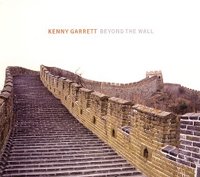
Beyond the Wall
By Kenny Garrett
Nonesuch
There is a long but uneven tradition of jazz artists experimenting with music from other cultures. Some immersed themselves in foreign musical environments, with richly rewarding results, whereas others would essentially skim the surface. What sets apart Kenny Garrett’s Beyond the Wall is the inspiration it draws from Chinese culture, while avoiding superficial juxtapositions of Eastern and Western sounds, giving it a cohesive and unified sound.
The proceedings certainly aren’t hurt by the stellar core ensemble, including jazz statesmen Pharoah Sanders and Bobby Hutcherson, along with the first-rate rhythm section of Mulgrew Miller, Robert Hurst, and Brian Blade. Sander’s tenor is as strong as ever, frankly dominating on the opener “Calling.” On the following title track, the reed players swing like mad on an up-tempo bop feature.
Several tracks also utilize vocals by Nedelka Echols, like “Qing Wen” translated as “May I,” a tune that displays the subtle Eastern melodic influence, well within the context of modal-oriented hard bop. Some reviewers, while enthusiastic about Beyond in general, have not been kind to the vocal elements. Yet, on “Qing Wen” and “Kiss to the Skies,” which feature Echols with a vocal ensemble, the combination creates a richly layered sound. “Kiss” features particularly sparkling solos from Miller and Hutcherson against the vocalized chants of Garrett’s beautifully spiritual melody.
While the sample of Tibetan monks used throughout “Realization (Marching Towards the Light)” gives the track a certain heaviness, but Garrett’s alto effectively floats above, carrying the melody. Another of the more explicitly Eastern sounding tunes is “Tsunami Song.” Featuring Garrett on piano with violin, cello, harp, and percussion, “Tsunami” is more mournful than stormy in tone. As strong as Garrett’s colleagues are, the dramatic closing track, “May Peace Be Upon Them” leaves no doubt as to whose session it is. Supported by Blade’s turbulent drumming, Garrett starts in a ruminative mood, building into an ecstatic crescendo, before finding resolution in a fitting conclusion to a consistently rewarding CD.
Garrett has previously recorded a Coltrane tribute album, and the spiritual dimension of the compositions on Beyond clearly reflect that influence. In fact, Beyond is dedicated to McCoy Tyner. As a synthesis of Trane, Tyner, and Eastern influences, Beyond is an impressive musical statement.